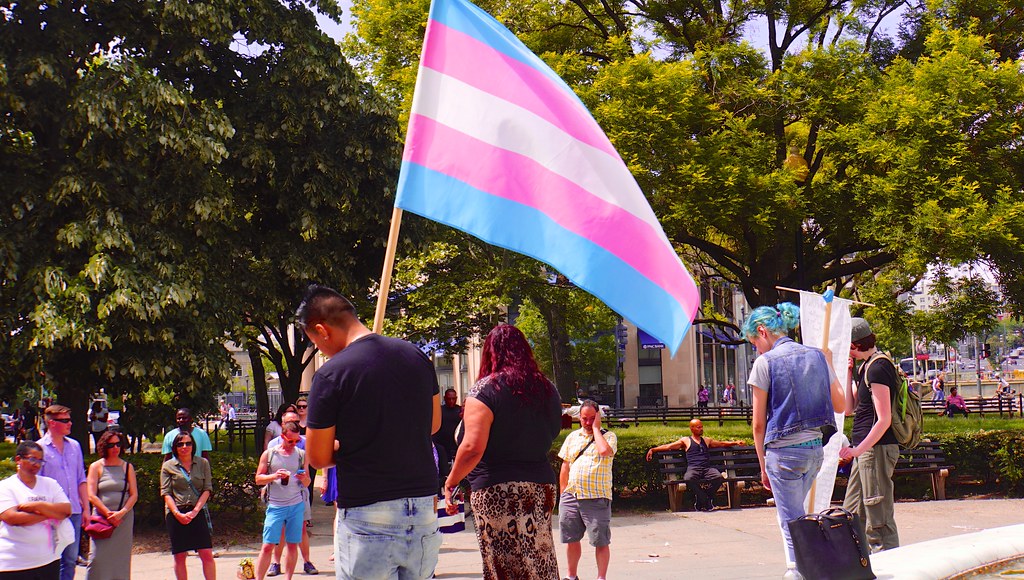Last year, two of my cis-hetero friends told me that their college-age child recently came out trans. I immediately shifted into protective Oggy Ruth* mode and wanted to protect all of them and make sure they had the resources they might need.

Free Mom Hugs
Free Mom Hugs was started by Sara Cunningham who is the mom of a gay son. Her advocacy started by offering to stand in as anyone mom if their biological mother refused to come to their child’s same-sex wedding.
Now there are Free Mom Hugs chapters throughout the U.S. Their members often attend pride events wearing “Free Mom Hugs” and “Free Dad Hugs” t-shirts, giving hugs to whoever wants them. It appears to be a great organization for parents who want to be involved and show support for the LGBTQ community.

Trans Education from Jammidodger
Jamie Raines is a bisexual trans man in the UK. He also has a Ph.D. in psychology and dissertation on something related to transgender people.
Jamie has a YouTube channel, Jammidodger, where he talks about and responds to a wide range of topics related to LGBTQ issues. He’s also been quite open his experiences taking testosterone as well as having top and bottom surgeries. Jamie also does videos where he responds to transphobic statements made by well-known people.
One thing I appreciate about his channel is when he responds to transphobic statements, he cites studies that support what he’s saying, so he’s not just telling his opinion, but providing evidence.
Where to Buy Clothes
One issue I had to deal with when embracing my non-binary gender is figuring out what size I wear in men’s clothing. I also wanted to try different looks, and I didn’t want to buy a bunch of stuff online, knowing I’d have to send most of it back because most menswear doesn’t fit an estrogen-generated body.
The place I first felt welcome to try on whatever I wanted was Buffalo Exchange. The staff is open to all types of people, and they don’t care what you want to try on. The only downside of Buffalo Exchange is they have dressing rooms labeled for men and women. I’ve also had good experiences trying on men’s pants at Lululemon and Eddie Bauer.
If you’re lucky, you live in or near a city that has a clothing store that specifically caters to trans people, like Margie’s Closet in Cleveland, Ohio.
Where to Get a Haircut
Not everyone feels comfortable getting their hair cut if they want a style that doesn’t conform to the gender they were assigned at birth. Thankfully, there’s the website Strands for Trans. It helps people find trans-friendly salons and barber shops.

How to Legally Change Your Name and Gender
I’ve worked with several parents who needed guidance while helping their adult trans child legally change their name and gender. The process is not rocket science, but it can seem overwhelming at times with the various forms. It’s also easy to get confused about the order in which you have to update everything.
Legally changing your name requires a court hearing. Check the county court where the child lives for information and the forms needed to change their name.
Thankfully it’s much easier to change your gender on your passport. It’s just a matter of applying for a new passport and select their correct gender – no additional proof needed. If they’re a trans man or trans woman, they can just as easily update their social security record.
Once they have their new passport, they can likely get their corrected driver’s license. If they want to correct their birth certificate too, contact the Office of Vital Records where they were born and them what documents they’ll need.
Where to Ask for Help
While there are plenty of resources for trans people and their families, they can also look to Reddit for help from strangers on the internet. There are subreddits for trans people, trans men, trans women, nonbinary people, and LGBTQ people. There’s even a subreddit to ask transgender people questions.
If your trans kiddo has a question about sex or relationships, they may want to check out advice columnist Dan Savage and the Savage Love podcast. If he hasn’t addressed your kid’s concern to date, they can call or email him with their question.
Dan and his partner also started the It Gets Better Project, which is an incredible place where LGBTQ people share their stories and messages of hope. Speaking of it gets better, if your kid is ever having a “baby trans” moment where they feel small, scared, or discriminated against, here’s a song that might help: It Gets Better by Rebecca Drysdale.
How to Protect Yourself
I would be doing a disservice if I didn’t mention this, and I’m really sorry this is how it currently is in the U.S., but violence against trans people is disturbingly high, especially trans women of color. There have also been mass shootings at gay night clubs, including at Pulse in Orlando in 2016 and Club Q in Colorado Springs in 2022.
Your kid may want to take some preventative measures like taking a self-defense class or carrying something for self-defense like pepper spray or the Go Guarded ring. I own the Go Guarded ring, and I’ve considered getting a bulletproof undershirt, but that thing costs hundreds of dollars.

* There is no gender-neutral term for aunt/uncle, so I created my own title: oggy. It rhymes with “doggy” and “foggy.”
